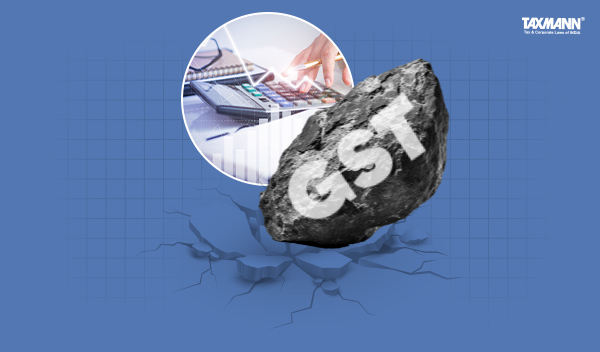[Opinion] Supplier Default Blues | The GST Impact on the Recipients ITC Claims
- Blog|News|GST & Customs|
- 3 Min Read
- By Taxmann
- |
- Last Updated on 17 July, 2024

CA Tanmay Bhardwaj – [2024] 164 taxmann.com 338 (Article)
Executive Summary
The article delves into the intricate landscape of Goods and Services Tax (GST) in India, focusing on the impact of supplier defaults on recipients’ Input Tax Credit (ITC) claims. It navigates through the nuances of ITC, highlighting compliance requirements and the authority’s power to deny ITC in case of supplier non-compliance. The financial and operational ramifications for businesses are explored, alongside a detailed examination of relevant legal provisions and recent judicial precedents. Practical guidance is provided, emphasizing proactive monitoring, robust documentation, contractual safeguards, and engagement with legal experts. The article underscores the necessity for businesses to fortify their defences against ITC denial allegations and advocates for a fair and pragmatic approach to GST enforcement.
1. Introduction
Since the advent of Goods and Services Tax (GST) in July 2017, the indirect tax landscape of country has completely transformed. The primary objective of GST was to eliminate the cascading effect of taxes and provide seamless flow of input tax credit (ITC).
2. Understanding ITC
ITC is the credit a business can claim for the tax paid on the purchase of goods and/or services used in the course of business. This mechanism prevents the cascading effect of taxes, ensuring that tax is levied only on the value addition at each stage of the supply chain. However, claiming ITC is subject to stringent compliance requirements, including possessing a valid tax invoice, having received the goods and/or services, filing of GSTR-3B returns by the suppliers and actual payment of taxes related to the tax invoice.
Form GSTR-3B is the monthly return filed by businesses to declare supplies made during the period, ITC claimed or reversed, and taxes paid under the forward and reverse charge mechanisms. Further, the supplier is required to declare the details of supplies in Form GSTR-1, and post that such details get reflected in Form GSTR-2B of the recipient of goods and/or services. From 1 January 2022, the reflection of details in GSTR-2B has become an additional eligibility condition for claiming ITC.
3. Denial of ITC by the GST Authorities
In accordance with Section 16 of the Central Goods and Services Tax Act, 2017 (CGST Act), ITC can only be claimed if the supplier has furnished the details of the invoice and has paid the appropriate GST to the government. The GST Authorities have the power to deny ITC if these conditions are not met. This issue has garnered significant attention as the GST Authorities have issued Notice to many businesses regarding the denial of ITC based on following circumstances:
- Non-filing of GSTR-3B by the Supplier: If the supplier fails to file their GSTR-3B return, the recipient’s potential ITC is denied due to the supplier’s non-compliance with statutory requirements.
- Non-payment of appropriate GST by the Supplier: Even if the supplier files GSTR-3B but fails to pay appropriate GST, the recipient’s ITC claim may be denied.
4. Impact on businesses:
The denial of ITC can have severe financial implications for businesses, including increased tax liabilities and cash flow issues. Businesses also face a heavy compliance burden to ensure their suppliers are filing returns and paying taxes on time, which contradicts the spirit of promoting ease of doing business. Additionally, the cost of litigation, if businesses opt to challenge the notices issued by GST authorities, in terms of both money and time, further undermines the idea of ease of doing business in India.
Click Here To Read The Full Circular
Disclaimer: The content/information published on the website is only for general information of the user and shall not be construed as legal advice. While the Taxmann has exercised reasonable efforts to ensure the veracity of information/content published, Taxmann shall be under no liability in any manner whatsoever for incorrect information, if any.

Taxmann Publications has a dedicated in-house Research & Editorial Team. This team consists of a team of Chartered Accountants, Company Secretaries, and Lawyers. This team works under the guidance and supervision of editor-in-chief Mr Rakesh Bhargava.
The Research and Editorial Team is responsible for developing reliable and accurate content for the readers. The team follows the six-sigma approach to achieve the benchmark of zero error in its publications and research platforms. The team ensures that the following publication guidelines are thoroughly followed while developing the content:
- The statutory material is obtained only from the authorized and reliable sources
- All the latest developments in the judicial and legislative fields are covered
- Prepare the analytical write-ups on current, controversial, and important issues to help the readers to understand the concept and its implications
- Every content published by Taxmann is complete, accurate and lucid
- All evidence-based statements are supported with proper reference to Section, Circular No., Notification No. or citations
- The golden rules of grammar, style and consistency are thoroughly followed
- Font and size that’s easy to read and remain consistent across all imprint and digital publications are applied



 CA | CS | CMA
CA | CS | CMA
